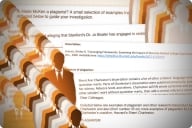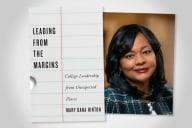You have /5 articles left.
Sign up for a free account or log in.
Months after an academic librarian deleted lists of “predatory” journals and publishers from his blog, a website with derogatory comments about his academic qualifications and mental health remains online.
Jeffrey Beall, scholarly communications librarian at the University of Colorado at Denver, for years maintained lists of scholarly journals and publishers he deemed “predatory” -- meaning they abused open-access publishing practices for their own monetary gain. The lists, while controversial -- one publisher threatened to sue Beall for $1 billion -- were a resource for many scholars wondering if the invitation to publish a paper or present at a conference sitting in their inbox was legitimate.
Beall in January removed the lists from his blog, scholarlyoa.com, reportedly because he “was forced to shut down [the] blog due to threats and politics.” Beall has declined to speak publicly about the decision.
Scholarlyoa.net, however (note the different top-level domain), remains. The website, which records show was created in 2014, bills itself as a “critical analysis of Jeffrey Beall’s blog [on] open-access publishing.” Beall’s own blog came with the tagline “Critical analysis of scholarly open-access publishing.” (Further quotes from the website have not been edited for grammar and spelling errors.)
“Beall is a so-called self-proclaimed journal critic who openly criticized and has attempted to discredit many Open Access Journals,” the “About Us” section of the website reads. “This campaign is part of a larger campaign to destroy Scholarly Open Access journals. … Beall’s conspiracy against the open access movement must end.”
The website goes on to label Beall an “academic terrorist,” a “predatory blogger” and an “alcoholic and drug addict” who “utilizes his blog to extort open access journal publishers to feed his drug habits.” It features several photos of Beall that appear to be taken from the university's website and Beall's social media profiles.
In its “About Jeffrey Beall” section, the website questions Beall’s academic credentials and accuses him of being “a huge cost to the University of Colorado system.” Another section mocks his criteria for determining whether a journal or publisher should be considered “predatory,” suggesting Beall is “suffering from some undiagnosed mental disorder.”
The website is now one of the top results when searching Beall’s name online. The domain was registered privately, meaning that information about who created the website is withheld from public view.
Friends of Open Access, the anonymous group behind the website, describe themselves as a “group of librarians across the world, honoring intellectual freedom and advocating freedom of expression with an opposition to censorship.” During 2015 and 2016, the group regularly updated the website with blog posts about Beall. The last entry was published on Feb. 27, 2016.
The home page appears to have been updated following Beall's decision to delete the lists. “Beall doubles down..,” the website reads. “Predatory blog shutdown. Jeffrey Beall will be criminally prosecuted in USA for fraud, extortion, bribery and money laundering.”
In a disclaimer, the group writes that the website and its assertions “constitute free speech,” comparing it to a book review. “In our opinion, Jeffrey Beall’s Open access blog is a very low quality blog, and potential researchers can benefit from our review about Beall’s blog,” the disclaimer reads.
Inside Higher Ed sent questions to the email address listed on the website and received a reply from someone who signed off using the group’s name.
“So-called bogus Beal [sic] list is still around the web,” the group said in response to a question about why, after Beall deleted the lists, the website is still up. “Therefore we need to keep this website active to expose Beall's conspiracy and corrupt practices. Beall is a[n] academic terrorist and professional scammer, may can [sic] emerge in a different form. Be vigilant.”
Roger C. Schonfeld, director of the scholarly communication program for the research and consulting group Ithaka S+R, said in an interview that the email and website read as though they were not written by librarians, but by someone whose business or personal interests were affected by Beall’s lists.
Schonfeld acknowledged that opinions on Beall’s work are sharply divided. “Lots of people have felt that his work has had a lot of value, but a lot of people have felt it’s the wrong approach and that it unfairly stigmatizes open access,” he said. “But all that said, the specific way that this website addresses the issues in calling someone an ‘academic terrorist’ -- it just doesn’t seem to me that, even anonymously, a professional librarian would say that about a peer.”
A spokesperson for the university said in an email that she was not aware of the website, but that she had forwarded the information to Beall and the university’s legal team. Beall, in a separate email, said, “Already seen it.”








